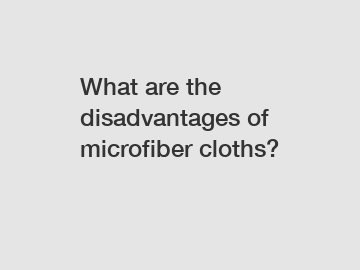What are the disadvantages of microfiber cloths?
When it comes to cleaning, microfiber cloths have gained immense popularity in recent years. Renowned for their effectiveness in capturing dirt, grime, and bacteria, these cloths have become a go-to choice for many households. However, like everything else, microfiber cloths also have their disadvantages that are worth exploring. In this blog post, we will delve into the drawbacks of microfiber cloths to provide you with a comprehensive understanding of their limitations.
1. Not Suitable for All Surfaces.
One of the primary disadvantages of microfiber cloths is that they may not be suitable for all surfaces. While they excel at cleaning smooth and hard surfaces like glass, stainless steel, and countertops, they can be less effective or even damaging on textured surfaces. The fine fibers of microfiber cloths might get caught in the deep grooves and crevices, potentially leaving lint behind or even scratching delicate surfaces. It's essential to consider the surface you are cleaning before opting for a microfiber cloth.

2. Limited Absorbency for Liquid Spills.
Microfiber cloths have excellent absorbency when it comes to picking up dirt and dust. However, they do not perform as well when it comes to liquid spills. Due to the densely woven fibers, microfiber cloths can only hold a certain amount of liquid, after which they become saturated. While they may be useful for smaller spills, larger liquid messes may require alternative cleaning methods to avoid spreading or creating streaks.
3. Special Care and Maintenance Required.
To maintain their effectiveness, microfiber cloths demand special care and maintenance. They should not be washed with fabric softener, bleach, or other chemical agents as these can damage the cloth's structure. Additionally, it's important to wash microfiber cloths separately or only with other microfiber items to prevent lint transfer. The onus of proper care falls on the user, making it a potential disadvantage for those looking for a fuss-free cleaning solution.
4. Potential for Cross-Contamination.
While microfiber cloths are renowned for their ability to trap and remove microscopic particles effectively, they also have the potential to harbor and transfer contaminants. Microfiber cloths can trap bacteria, dirt, and other microbes, which can then be easily spread from one surface to another if not cleaned properly or washed regularly. It's crucial to ensure that microfiber cloths are thoroughly cleaned and sanitized between uses to avoid cross-contamination.
5. Limited Lifespan.
Despite their durability, microfiber cloths have a limited lifespan compared to traditional cotton or synthetic cleaning cloths. Over time, with frequent use and washing, the microscopic fibers of the cloth can deteriorate. As a result, the cloth may lose its effectiveness and start to leave lint or streaks on the surfaces being cleaned. Regular replacement of microfiber cloths is necessary to maintain their cleaning efficiency, which can be an added expense for some users.
Conclusion.
Microfiber cloths certainly have numerous advantages that have made them a popular choice for many looking to achieve a higher level of cleanliness in their homes. However, it is important to be aware of their limitations as well. The inability to perform optimally on certain surfaces, limited absorbency for liquid spills, special care requirements, potential for cross-contamination, and the need for regular replacement are all factors to consider when using microfiber cloths.
Ultimately, it boils down to weighing the advantages against the disadvantages and determining if microfiber cloths suit your specific cleaning needs. By understanding the limitations presented in this blog post, you can make informed decisions about the best cleaning tools for your home or workspace. Remember, no single cleaning cloth can be a perfect choice for every situation, so it's always wise to have a versatile arsenal at your disposal.
For more bamboo microfiber cloth supplier, carbon cloth cleaning, weft knit fabricinformation, please contact us. We will provide professional answers.

Comments